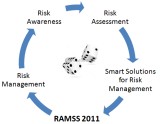Risks Awareness and Management through Smart Solutions (RAMSS 2011)
 |
Risks Awareness and Management through Smart Solutions (RAMSS 2011)
Szczecin, Poland, September 18-21, 2011
Description
A risk is something at a borderline, which does not guarantee the success and cannot be sure of the failure. Risks are present everywhere, in the daily life (e.g., cross the street, drive a car, eat fish), in business (e.g., investments, hiring), or in IT (e.g., adopt a new IT solution, develop a software).
Challenges concerning risks are mainly related to become aware of them, to explicitly consider them, to avoid them if possible, to neutralize them when possible, and to be ready to face them properly.
The aim of this event is to focus on the identification and modeling of risks and their characteristics, as well as on the solutions adopted to address risks in various application domains. In particular, we are interested to explore if and how the advances in the IT domain may provide support to identify and address/manage risks. Risks are strongly related to business aspects. For example, financial risks may change business models, security risks may lower the customers’ confidence, or work risks may lead to a high turn-over of the employees.
We consider that a system of any type may work in three different conditions: normal, when the executing conditions are proper for the system functioning, risk, when one or more executing conditions tend to stay or overcome their normal limits, and emergency, when a damage has been verified in the execution conditions. Hence, risks may be seen as pre-emergencies. The challenge is to monitor the system and to identify risks to address them and avoid emergencies. Of course, this is not always possible: emergencies may also occur suddenly without any prelude.
The participants to this event will be encouraged to discuss the IT advances (from design to available technologies) which can be successfully exploited in risk management systems in any application domain. For example, the MAPE (Monitoring, Analyzing, Planning, Executing) loop or Deming (Plan-Do-Check-Act) loop can be used to design risk management systems. Or, sensor networks or wearable technologies can be used to implement risk management systems.
Topics
Topics include (but are not limited to):
- Risk definition, features, and application domains;
- Risk management systems: analysis, design, and implementation;
- Risk management systems: evaluation and testing;
- Case studies;
- Smart environments for risk prevention;
- Legislation and rules;
- Business risk;
- Risk and recovery;
- Security and trust;
- Tools and business intelligence strategies for risk prevention;
- Risk awareness in self-healing systems;
- Semantic enhancement of software for risk awareness;
- Open software for training and education to risk procedures.
Paper Submission and Publication
- Papers will be refereed and accepted on the basis of their scientific merit and relevance to the workshop.
- Accepted and Presented paper will be published in the Conference Proceedings and included in the IEEE Xplore® database and indexed in the DBLP.
- Authors should submit draft papers (as Postscript, PDF of MSWord file)
- The total length of a paper should not exceed 8 pages (IEEE style). IEEE style templates are available here.
- Extended versions of selected papers presented during the conference will be published as Special Issue(s) of journal(s) to be announced later.
- Organizers reserve right to move accepted papers between FedCSIS events.
Important Dates
- Paper Submissions: June 19, 2011
- Authors Notifications: July 16, 2011
- Final Submissions and Registrations: August 7, 2011
- The Conference Dates: September 18 - 21, 2011




















